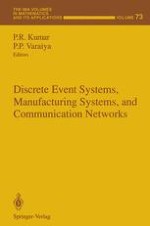
1995 | OriginalPaper | Chapter
Markovian Fragments of COCOLOG Theories
Authors : P. E. Caines, Y. J. Wei
Published in: Discrete Event Systems, Manufacturing Systems, and Communication Networks
Publisher: Springer New York
Included in: Professional Book Archive
Activate our intelligent search to find suitable subject content or patents.
Select sections of text to find matching patents with Artificial Intelligence. powered by
Select sections of text to find additional relevant content using AI-assisted search. powered by
The COCOLOG (Conditional Observer and Controller Logic) system is a partially ordered family of first order logical theories expressed in the typed first order languages {L k ;k ≥ 0z describing the controlled evolution of the state of a given partially observed finite machine M The initial theory of the system, denoted Th0, gives the theory of M. without data being given on the initial state. Later theories, $$\{ Th(o_1^k);k \ge 1\}$$ , depend upon the (partially ordered lists of) observed input-output trajectories, where new data is accepted in the form of the new axioms AXMobs(L k ),k ≥ 1. A feedback control input U(k) is determined via the solution of control problems posed in the form of a set of conditional control rules, denoted CCR(Lk), which is paired with the theory $$Th(o_1^k)$$. The disadvantage of this formulation is that the accumulation of observation axioms may handicap the speed of reasoning. In this paper, by use of a restricted subset, $$L_k^m$$, of each language L k , k ≥ 1, we introduce a restricted version of COCOLOG; this is called a system of Markovian fragments of COCOLOG and it is designed so that a smaller amount of information than in the full COCOLOG system is communicated from one theory to the next. Systems of Markovian fragments are associated with a restricted set of candidate control problems, denoted $$ CCR(L_k^m)$$k ≥ 1. It is shown that, under certain conditions, a Markovian fragment theory $$MTh(o_1^k)$$ contains a large subset of $$Th(o_1^k)$$ which includes, in particular, the state estimation theorems of the corresponding full COCOLOG system, and, for the set of control rules $$CCR(L_k^m)$$, possesses what may be informally termed the same control reasoning power. In formal terms, this means that $$MTh(o_1^k)$$ with respect to the well formed formulas in $$L_k^m$$. Hence a theoretical basis is supplied for the increased theorem proving efficiency of the fragment systems versus the full COCOLOG systems. Finally some computer generated examples are given illustrating these results.